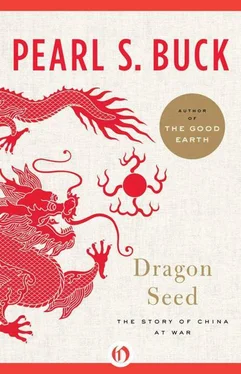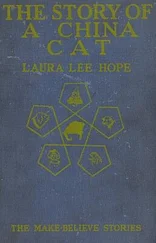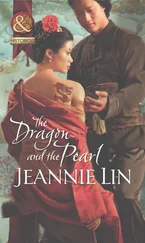… In the field Ling Tan and his second son worked together. The times were somewhat better for farmers now than they had been, in this one way, that so many farmers had died or had gone to the free lands that there was not enough food for the enemy, and so less than they had the enemy took men off the land either for death or bitter labor. Yet Ling Tan kept his eyes on the road and whenever he saw the enemy, he would tell his son and Lao Er would go quickly into the house and take his wife and child down with him into that secret room until it was safe to come up again. For who could trust that enemy for anything except evil?
But the bitterness of the enemy’s rule did not abate. Of what Ling Tan took from his land he had the good of less than one third, and his taxes were grievous. He could only curse in his heart because well he knew that even the high enemy did not get the good of these taxes, but the little enemies at the bottom, the petty men. For they all knew, mouth to ear, that never had such rapacious rulers put themselves over any people. There was nothing this enemy would not do for money, and if any wished to buy or sell or smuggle goods, it could be done if money enough was put first upon the palms of the enemy. The very guns the hillmen used nowadays, that came from foreign parts, were smuggled in by little enemy men who thought only of their own gain, and were traitors even to their kind. Up the river guns could be smuggled to the army in the free land, if money were given to the many outstretched enemy hands.
All these things Ling Tan knew as every one knew, and it was so much good news. Though men might gnash their teeth for the moment, such rottenness in the enemy everywhere meant that one day they would be rotten enough to be overthrown and to be cast into the sea.
“We wait the day,” Ling Tan often said to his son. “We will hold the land against that day.”
… “It is nothing,” Jade said. She turned her head away from her husband and poured him a cup of hot water before he slept. There was not often tea in the pot now, and most of the time they drank hot water.
But he caught her wrists and took the teapot from her. “There is something,” he said. “Do you think you can draw your breath differently and I not know it?”
“You must not watch me so,” Jade said, and she tried to pull away from him, but she could not.
“I do not watch you,” he said. “I know without watching you. When you change I know from within myself.”
So coaxing her and commanding her and she biting her pretty lower lip and first laughing and then saying again it was nothing, and then putting her sleeve to her eyes to wipe her tears away, but angrily because she wept too easily now while she waited for the child, she yielded to him, and she said:
“It only came to me today — how I am no better than any farm woman, and if we had stayed in the free land, would we not have done something great, too? I could have been of more use — you and I together—”
“This is because you have seen that woman,” he said.
“Is there any sin in her or me because she makes me want to do something greater than sit behind these walls and bear children?” she asked hotly and now she did pull away from him, and he let her.
“Is it so little to you that you bear my children?” he asked.
But now she would not answer and for a while he did not speak, either, first because he was somewhat hurt by her, and second because he had not the words ready. He had always to sort the feeling out of his mind and then to put it into words for her. The feeling was there, strong and stubborn, and he knew she was wrong, but how could he tell her so and make her feel as he did? This Jade was so mixed with large and small, and he must be sure to pluck the right part in her now. But he struggled against his own simplicity.
“Had I only been a learned man!” he murmured.
He could not have spoken better, for this touched her, and she was so made that she would not hear of fault in any that was hers.
“You are well enough,” she said more kindly, and he knew that as far as he had stepped it was well, so he went on.
“To me, we do the bravest thing,” he said, speaking slowly and with care for truth. “How easy it is to go to the free lands! How safe it is there! It is easy to get guns together and men and to fall upon here a garrison and then there again. It is the easiest way to risk life. And we all risk life these days if we hate the enemy. And then there is glory — to do as my younger brother does, is to get glory very easily. But who gives glory to us? We only stay and try to live as ever we have. But this is our way of making war — to stay, and to take no suffering as cause to leave. In this there is no glory.”
He paused and considered. “It may be that some day we shall be given glory for this too,” he said. “But I do not know. What does it matter if there is glory, so long as we hold the land?”
“Yet even the land belongs to the enemy if they rule here,” she said sadly.
“The land belongs to those who till it,” he said. “If the enemy put us off the land and sent their own kind to till and to sow and to reap, then — but then we would still fight.”
She did not answer this and he went on. “You in your way, when you bear a child, you add another to hold the land. And can any other do this except women like you? We who are men, we can grow food, but can we make other men to take our places? It is you who do this, and what you do is the thing that must be done if our people are to live. If women do not bear children, can we live?”
She sat very still, hearing these words as he let them come from him one by one, as painfully as though he forged them.
“When you have our child,” he said, “you hold our land through him.”
That was all. He could say no more, and he was as weary as though he had fought a battle. He had fought a battle and he had won. She knew that he was right.
… Now in all this, who had given one thought to the eldest son? He stayed in the hills doing his simple duty, and he laid his traps here and there and caught an enemy or two a few times a month, but not so often as once he had. For the enemy had grown wary of traps, and he had to beat his brains to devise new ways of making traps. In his own way he was brave enough, for he came nearer and nearer to the city and laid his traps so close sometimes that others except the enemy were caught. But if he peered down into a pit some morning and found an honest farmer cursing at the bottom, or a beggar or a peddler, he always let him free, and he was forgiven when that one knew why the trap was made.
He went on with this work, but these days he carried in him a sulky heart, and he told no one why it was. The truth was that he felt himself neglected and overlooked and forgotten in all this matter of his youngest brother. He felt that it ought not to be that his younger brother had a wife before he did, and that his father and his mother had put aside their duty to him.
When his second brother came and told their younger brother what the woman had said, that one made great noise to get himself ready to go to the free land. From among his men all who wanted to go with him were to go, and every man who had not his family too heavy on him was eager for it. Him, too, his brother had called and he had been very lordly and he said:
“Do you want to go with me, my brother, to the free land? If you do, you may tell my parents I said you were to go, and I will see that nothing but good comes to you.”
Now Lao Ta did not at all like this way of speaking. Lao San had not called him elder brother as he should, and how could he go beneath one younger than he? He wanted nothing to do with that woman or with what his brother did.
Читать дальше












